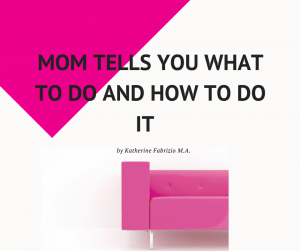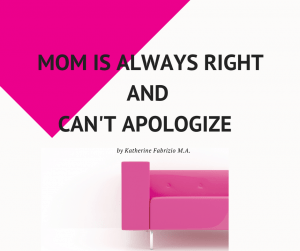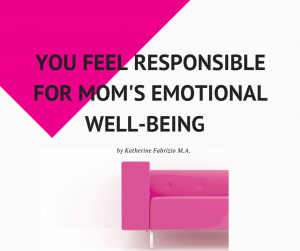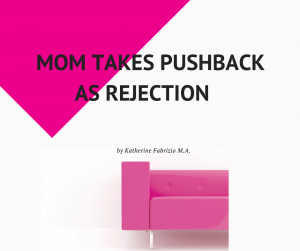Updated April, 2025
Narcissistic Mother Empath Daughter = The Good Daughter Syndrome®. ( If you would rather listen- go to the end of the post for the audio version of this post)
If you are empathic and your mother is narcissistic, borderline, or just plain difficult, you might be suffering from the Good Daughter Syndrome- good for Mom, bad for you.
Your mother has issues.
Boy, does she have issues..manipulative, intrusive, self-absorbed, and critical… hardly begins to cover it. And you FEEL it all. Attuned and sensitive, you’ve always picked up if Mom was okay.- It’s like you have this radar, this 6th sense about Mom. And to be honest, you aren’t sure if it’s a blessing or a curse because… you can’t relax until Mom is okay and okay with you.
This isn’t unusual.
Daughters of Narcissistic Mothers show symptoms that can be mild to devastating. In this syndrome, the empathic daughter works to be good for mom, look good for mom, and make sure mom is good with her. It’s an endless, thankless, and ultimately impossible quest. ( read to the end to get access to all the resources I have for you).
How does this happen?
Exhausted daughters in this Good daughter role have been trained to place Mom’s needs ahead of their own. After a while, it becomes second nature. They may be obedient, conflicted, or independent. (go here to find out which role you have taken on) yet have the same underlying dynamic with Mom.
How do I know?
First of all, I lived it. It was my story, but I didn’t have a name for it. Then, after a long journey of both giving and receiving psychotherapy, I started to realize others were out there suffering, too.
Daughters who were particularly compassionate and had mothers who were troubled, narcissistic (either overt or covert), or borderline frequently fell into what I call The Good Daughter trap, a trap that sucked the life out of them and chained them to their mothers’ pathology.
After counseling daughters of difficult mothers for over 30 years, I started to notice a trend. These daughters felt terribly guilty and stuck in their relationship with their mothers. They need strategies that were fair and compassionate while still being effective.
Why do this work?
Without healing, this Good Daughter Syndrome can steal your happiness in ways you never realized. It can be so insidious that you aren’t aware of its consequences.
But, once you see it, you can begin to get free.
So, how can you tell if you are trapped in The Good Daughter Syndrome®?
Here are 10 signs of The Good Daughter Syndrome®- can you relate?
1) No matter how hard you work for Mom’s approval, it’s never good enough.
Whether Mom criticizes you outright or her criticism is implied, you get the message it’s never good enough; you are never good enough. With her constant comments, you get a distinct feeling there’s something wrong with you and that she’s trying to fix or better you.
2) Mom gives you unsolicited advice.
She is always making suggestions about weight, hair, parenting; you name it, there isn’t an area she won’t weigh in on. What’s more, she expects you to answer to her and take her advice even when you haven’t asked for it.
3) Mom is never wrong and never sorry.
You won’t hear, “I was wrong, and you were right.” Nope, she just can’t give it to you. By the same token, you won’t hear a genuine apology. Because of this, you end up having some version of the same argument over and over without getting anywhere. Never one to concede a point, Mom keeps belaboring the same thing over and over. The whole affair would be comical if it weren’t tragic.
4) Mom doesn’t respect your boundaries
You have a hard time setting healthy boundaries with Mom and a harder time sticking to them. Setting a boundary feels like breaking a rule you never knew existed. If you do manage to set that boundary, you would think you’ve done the most offensive thing a person could do.
5) You feel responsible for Mom’s happiness.
You wish it were different, but if Mom isn’t happy, you fear if it’s, you’re your fault. This underlies many reasons you have such a hard time setting boundaries and standing up to mom. Deep down, you feel responsible for making your mother happy.
6) Mom takes any pushback as a rejection of her.
Shutting you down, she says something along the lines of, “I was just trying to help. I guess I’m just a horrible mother.” It is almost impossible to have a reasonable conversation with Mom. She gets defensive and upset if you have a problem with anything she does. You end up feeling like it just isn’t worth it.
7) Mom thinks she knows what is best for you.
Always. It goes without question, at least in her mind. The unstated but heavily implied rule is” Mother knows best.” If you dare to challenge it, there is hell to pay.
8) Although not explicitly stated, making Mom look good and feel good is your job.
Whether you are picking out an outfit for a holiday meal or choosing a profession or mate, you know Mom will regard your choice as a reflection of her.
9) Standing up to Mom is hard for you.
You don’t want to rock the boat. Yep, it’s more than hard—it’s almost impossible. You know the phrase all too well:” If momma ain’t happy, ain’t nobody happy.” Your mother’s mood sets the tone, and you don’t want to mess with that.
10) Plagued by self-doubt, you constantly second-guess yourself.
It is hard for you to make decisions and feel confident about them. Mom’s taught you that you can’t rely solely on your judgment.
Do you see yourself in 7 out of the 10 statements?
As a psychotherapist of over 30 years, I keep seeing the Narcissistic mother and her empath daughter result in the Good Daughter Syndrome.
These are the daughters who care too much and get too little. I see my clients giving too much and getting too little in their intimate relationships, striving for unattainable perfection, or feeling like a fraud in their professional lives. Their real selves are hidden underneath a mask of faux perfection. When I dig further, I find insecure-anxious daughters taking care of or being good for their Mom instead of looking out for themselves.
It’s a trap that keeps the Narcissistic mother empath daughter; being “good” for mom when it is bad for them. The truth is, it doesn’t really help anyone. It just keeps the dysfunction going.
How do you recover from the Good Daughter Syndrome?
1.Become aware – educate yourself about narcissism, overt and covert, borderline personality disorder, and the traits that comprise each. Learn how the defenses each disorder uses play out in interpersonal relationships.
2. Learn how this mother/daughter dynamic plays out over development- here’s an article I wrote about it.
3. Learn to set boundaries– that will stick and that you can stick to. Explore how boundaries are 90% internal and only 10% external on the surface. You must attend to the internal boundaries in order to stay resolute regarding the external.
My book, a best-seller and being translated into Spanish, Turkish and Chinese is helping thousands of Good Daughters escape this dynamic and get free.
Get the The Good Daughter Syndrome-here.
Excerpt from the Good Daughter Syndrome- When Mom has a self-disorder such as narcissism, borderline, or histrionic, she will form defenses to shore up her feelings of insecurity. Her daughter will sense this and compensate for her mother’s psychological deficits by creating agreements and beliefs that are hidden to her conscious mind in adulthood. Over time, these unconscious agreements and false core beliefs become hardwired into her daughter’s psyche, trapping her into the illusion that if she takes care of Mom, Mom will take care of her. She can awaken from this syndrome and escape the traps so that she can live into a life that is hers and hers alone.
Find out if you are the Good Daughter – go here to take the quiz- It’s quick, and it’s free.
How are you good for Mom in ways that might be bad for you? Let me know in the comments. —————————————————————————————————————————————————————————————–
Sources:
-Siegel, D. (2010). Chapters 8, Prisoners of the Past and Chapter 9, Making Sense of our Lives: Attachment and the Storytelling Brain in Mindsight: The new science of personal transformation.
-Van der Kolk, B. (2015). Getting on the same wavelength: Attachment and attunement. The body keeps the score (pp. 107-124).
Penguin Books. Schore, J. & Schore, A. (2008). Modern attachment theory: The central role of affect regulation in development and treatment. Clinical Social Work Journal, 36, 9-20.
Allen, J. G. (2013). Attachment in children. Mentalizing in the development and treatment of attachment trauma (pp. 59-110).
Routledge. Mary Main, M. (2000). The organized categories of infant, child and adult attachment. Journal of the American Psychoanalytic Association, 48(4), 1055-1095.
Peter Fonagy et al, (1993). Measuring the ghosts in the nursery: An empirical study. Journal of the American Psychoanalytic Association, 41, 957-989.
Sroufe, L.A. (2005). Attachment and development: A prospective, longitudinal study from birth to adulthood. Attachment & Human Development, 7, 349-367. Golomb, Elan Ph.D. (1992).
Trapped in the Mirror: Adult Children of Narcissists and Their Struggle for Self. New York, N.Y.: William Morrow.
Lawson, Christine Ann. (2004). Understanding the Borderline Mother: Helping Her Children Transcend the Intense, Unpredictable, and Volatile Relationship. New York: Rowman& Littlefield Publishers Inc.
Lerner, Harriet. (1985). The Dance of Anger: A Woman’s Guide to Changing the Patterns of Intimate Relationships. New York, N.Y: HarperCollins. Martinez, Mario. (2016).
The Mind-Body Code: How to Change the Beliefs that Limit Your Health, Longevity, and Success. Denver Colorado: Sounds True.
McBride, Karla. (2008). Will I Ever Be Good Enough? Healing the Daughters of Narcissistic Mothers. New York, N.Y.: Free Press.
Miller, Alice. (1997). The Drama of the Gifted Child: The Search for the True Self. revised edition New York, N.Y: Basic Books
Frequently Asked Questions:
Yes, Good Daughters erroneously feel like it is their job to make sure mom is happy.
Suffocated, appropriated, trapped, guilty, stifled,
The dynamic that can result from an empathetic, sensitive, attuned daughter has a narcissistic, borderline difficult mother, and the daughter attends to her mother’s needs instead of her own.
Individuated, separate, differentiated, sovereign.
Instead of differentiating and separating, a good daughter bases her happiness on if her mother if okay with her.
Because boundaries reinforce the fact that you are separate from Mom, and Mom is used to eradicating your boundaries or pretending they don’t exist in the first place.
















Your articles on toxic mother daughter relationships and narcissism has been so helpful and right on the money. I just wanted to extend my gratitude to you for sharing your fantastic clear and concise work.
Hi Julie- Thank you so very much for this comment. I am thrilled you have gained value from my content.
I’m writing a book on the empathetic daughter and the difficult mother, and how to escape the Good Daughter Trap. This will go into even more detail- so stay turned.
Take care,
Katherine
Phew, thank goodness you are doing this! Sincere thanks for wake up call and way out…
Hi Michelle,
Thank you for writing in. I am so glad to bring this information to those who can use it. It took me decades to first wake up and then to find a way out… and finally to bring it to my psychotherapy clients adjusting for all the variations of this Good Daughter theme. I hope to shorten the learning curve for you.
Take care,
Katherine